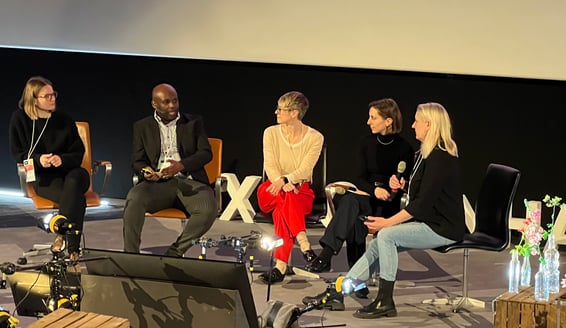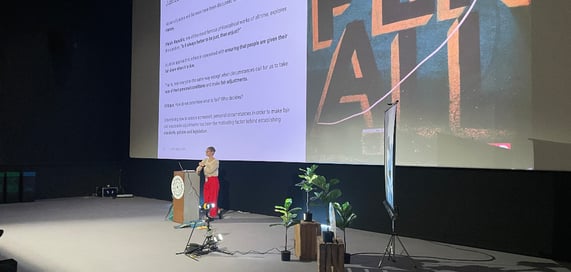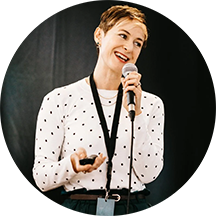UX and Design
Degrowth and consumerism: UX Copenhagen 2024
22 April 2024 • 6 min read

Last month I attended UX Copenhagen, where the theme of the conference was Degrowth and Consumerism. One speaker after another featured statistics about the state of the world that made your head explode and your heart ache. I’m not going to repeat them here, but if you’re looking to put your emotional resilience to the test, just pop ‘climate emergency statistics’ into a search engine. While each keynote did its best to connect the dots to actionable takeaways, all the evidence pointed to a much bigger unmet need; we need to drastically change how we do business.
I’m not saying anything new here, but it’s abundantly clear that we are far past the point of getting individuals to simply recycle, minimise food waste and turn off the lights when they leave the room. Yes, these small actions all add up to become a net positive, and therefore shouldn’t be discouraged, but the change we need has to happen at an organisational, sector and industrial level. I like to call this MAC for short – it stands for Massive Acts for Change. However, this is where individuals, as agents of change, feel least empowered.
The future is just a prediction. Another way is possible
Trapped between fear and lack of empowerment can leave us feeling hopeless about the future. Here’s how ethical frameworks, tools and perspectives can give us new skills, narratives and positions to occupy so that we can build a better tomorrow.
My contribution to the two-day conference was a workshop titled 'Tech Ethics For Practitioners'. The workshop was a two hour session that introduced attendees to tools and ethical approaches that can be used to support the responsible design of tech products and services. Attendees – user researchers, design researchers, product and UX designers – were very keen to learn about the various tools, but most said they would find it very difficult to use these new tools due to the power imbalances and priorities that exist within the organisations they work in. Simply put, those that want to action change, don’t feel they’re in a position of influence to do so, and that acting responsibly is in competition with profit-making motivations.
This feedback from attendees at the workshop aligns really closely with conversations I have day-to-day. There are two things that crop up most often. Firstly, I’m told more often than I would like to hear, that people are afraid of the future. Between the climate emergency, artificial intelligence and cost of living crisis, people increasingly tell me that they don’t feel positively about the future and in fact, thinking of the future gives them anxiety. In what was a new request for me, someone reached out to me recently asking if I had the number of a therapist that specialises in anxiety about AI. This is not just anecdotal experience, research shows that worldwide, feelings of anxiety have increased over the last ten years, and this pre-pandemic research led by UCL shows that incidences of depression, anxiety and stress have increased over the last two decades. Secondly, often in what is the proceeding thought to the above, I am told by people that they feel they can’t do anything differently at work because profits and growth are the most important thing, and that any efforts to implement responsible action at work will be met with indifference, inertia or worst of all, being told to find another employer.

Presenting at UX Copenhagen
The cost of pursuing profits over everything else
Feeling stuck between fear and lack of empowerment is not only a depressing position to find yourself in, but it’s also dangerous and leads to the development of powerful myths.
It assumes that one cannot do ‘good’ business and so instead, one has to choose between doing good and making money. The 8,254 certified B Corporations across 162 industries in 96 countries would disagree, as too would a globally successful business like Patagonia.
It leaves individuals with the mistaken belief that no other ways of working are available to them. Methods like value sensitive design, systems thinking, circular design and human-centred design are all at the heart of user experience. Research time and again shows that understanding needs, solving problems and meaningfully including user feedback into the design process have all proven to be successful and viable ways of working – all leading to greater efficiencies in product development, greater ROI, increased sales and greater customer loyalty.
It mistakenly perpetuates the belief that pursuing anything other than profits creates a risk for a business that simply isn’t worth taking. In fact, the opposite is true. What’s the risk of not being responsible? What is the cost of continuing to pursue profits over everything else? It’s becoming increasingly easier to answer these questions.
- The maximum penalty for non-compliance with the prohibitions of the EU AI Act is €35,000,00 or 7% of worldwide annual turnover, whichever is higher. AI operators who provide incorrect, incomplete, or misleading information, can be fined the higher of either €7,500,000 or 1% of total worldwide annual turnover.
- In 2015 a Dutch environmental group, the Urgenda Foundation, and 900 Dutch citizens sued the Dutch government to require it to do more to prevent global climate change. The Dutch government has lost their preceding appeals, and the courts continue to uphold the final decision that the government is failing on their duties to protect a right to life and the right to private life, family life, home, and correspondence.
- After Google’s claims that incognito mode protected a person’s privacy were proved to be false, the company has agreed to pay a fine of $5 billion (although this might reach $7.5 billion) and destroy billions of data records.
- While it still needs to face legal challenges, the state of Florida is moving forward with its ambitions to become the first state in the US to ban social media accounts for children under 14.

Presenting at UX Copenhagen
Lastly, occupying a position at the intersection of fear and lack of empowerment makes us feel stranded and hopeless about the future. But, and this is an enormous and very hopeful ‘but’, the future hasn’t happened yet. We get to make it and shape it and change it because it has yet to become a reality. The next ten years don’t have to follow through on all those horrendous stats I encouraged you not to search for at the start of this article. A lot of those stats are predictions, predictions we don’t have to live up to.
If ethics is about engaging in conversations and taking action on what it means to live a good life, then as digital and technology professionals, we need to be accountable for the role we play in how data and technology increasingly inform what it means to live a good life. If we believe this, which I believe that many of us do, then we need to see ethics as a frontier skill within a wider digital skills set and close any identified gaps.
We need to give individuals new skills, new narratives and a new position to occupy. Ethical frameworks, tools and perspectives can help us imagine a different future. They can help to reduce risk by supporting critical thinking and scenario planning. They encourage action on both an individual and organisational level by allowing people to start small, like asking a handful of questions that encourage debate, before moving onto reorganising processes and ways of working. I’ll say it again, the future hasn’t happened yet. We get to create it one MAC at a time.
Let’s get busy.
To learn more about how to create your own tech ethics framework, you can read this article here, or reach out to us today to see how we can help you.



